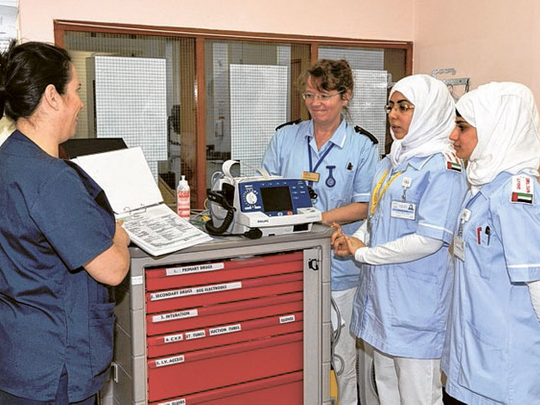
There are no Emirati midwives in the emirate of Abu Dhabi a recent report from the capital's health authority has stated.
The 2010 Emiratisation of Health Care Present and Future report, released by the Abu Dhabi Health Authority last month, states that of the 74 registered midwives in the emirate, none are UAE nationals.
More shocking figures from the report reveal the number of midwives per 100,000 people is four; where as the average number of midwives per 100,000 people, should be, just over 200.
Pam Cawley, Associate Academic Dean of Health Sciences at the Higher Colleges of Technology (HCT) in the capital, said the lack of Emirati midwives in Abu Dhabi and across the UAE is a matter of national security.
"In terms of career planning if all of the expatriates in the UAE were to pull out and there was no Emirati population to take over and care for their country, then there'd be a serious national security issue," said Cawley.
The HCT, in partnership with the Abu Dhabi Health Services Company — SEHA and Corniche Hospital in Abu Dhabi, has launched a bachelor's degree in Applied Science and Midwifery. The degree course, which will run in February 2011, was introduced as an initial step towards addressing the lack of Emirati interest in the health sciences and, more specifically, midwifery.
New course
The same degree course was previously on offer at the Dubai HCTs in collaboration with the Dubai Health Authority. However, it was cancelled due to unforeseen circumstances, but the college graduated three Emirati midwives in total, said Cawley.
Enrolment in the 18-month bachelor's course in Abu Dhabi is currently only open to Emirati registered nurses or graduate nurses in training.
"Right now it's a post registered nursing programme open to registered nurses who may already be employed or new graduates seeking employment," said Cawley.
To focus on quality rather than quantity the initial intake will be ten students.
"If we think in terms of right now, to recruit a midwife we have to look outside the country," said Lunda Mikalauskas, Chief Clinical Officer at Corniche Hospital.
"[But] just at Corniche we could take on 40 midwives for the amount of births we have; then there are all the other SEHA facilities also in need of midwives…but there simply isn't a large enough international pool of nurses and midwives to recruit from," she added.
"A lot of young Emirati women who do nursing have some problems of family acceptance with them working shifts when they enter the health care environment," said Jo Hubbard, Director of Education at Corniche Hospital. "It [nursing] is not yet recognised as a profession to look up to," she added.
"The image of nursing in this country is misconstrued," said Cawley. "There is a misunderstanding as to what nursing and midwifery is as a profession, because many see it as a servant's position," she said.
Profession explained
Cawley added that in an attempt to change this misconception, graduate Emirati nurses have been sent out to secondary schools to explain the profession to their peers.
"Emiratis talking to Emiratis from the heart, in Arabic, answering questions, is the best way to recruit the young into the field," she said.
However, according to the recent Abu Dhabi Health Authority report, the aim is to produce almost 4,300 midwives for Abu Dhabi by 2015; 25 per cent (1,072) of which should consist of Emiratis.
To hit this target health science programmes would have to graduate almost 900 midwives per year, 214 of which would have to be nationals.
Similarly, the 2015 ambition for overall nursing numbers by the Abu Dhabi Health Authority is almost 14,500; again 25 per cent (3,604) of which should be Emirati. To achieve this, nursing programmes must graduate almost 800 nurses a year.
What is midwifery?
Midwifery is an autonomous practice whereby the midwife, a qualified health care professional, provides care to childbearing women throughout their pregnancy and delivery as well as after they give birth.
Although autonomous practitioners, they are specialists in low-risk pregnancies and childbirths. However, midwives are trained to recognise and deal with deviations from the normal during pregnancy, upon which the mother is referred to an obstetrician.
- 0 Emirati midwives in Abu Dhabi
- 4 midwives per 100,000 people in Abu Dhabi
- 1,072 Emirati midwives should be practising by 2015
- 14,416 nurses should be practising by 2015
*Source: 2010 Emiratisation of Health Care Present and Future report, Abu Dhabi Health Authority











